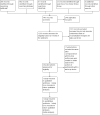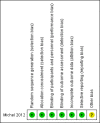Recanalisation therapies for wake-up stroke
- PMID: 30129656
- PMCID: PMC6513546
- DOI: 10.1002/14651858.CD010995.pub2
Recanalisation therapies for wake-up stroke
Update in
-
Intravenous thrombolytic treatment and endovascular thrombectomy for ischaemic wake-up stroke.Cochrane Database Syst Rev. 2021 Dec 1;12(12):CD010995. doi: 10.1002/14651858.CD010995.pub3. Cochrane Database Syst Rev. 2021. PMID: 34850380 Free PMC article.
Abstract
Background: About one in five strokes occur during sleep (wake-up stroke). People with wake-up strokes have traditionally been considered ineligible for thrombolytic treatment because the time of stroke onset is unknown. However, some studies suggest that these people may benefit from recanalisation therapies.
Objectives: To assess the effects of intravenous thrombolysis and other recanalisation therapies versus control in people with acute ischaemic stroke presenting on awakening.
Search methods: We searched the Cochrane Stroke Group Trials Register (last search: 9 January 2018). In addition, we searched the following electronic databases in December 2017: Cochrane Central Register of Controlled Trials (CENTRAL; 2017, Issue 11) in the Cochrane Library, MEDLINE, Embase, US National Institutes of Health Ongoing Trials Register ClinicalTrials.gov, World Health Organization International Clinical Trials Registry Platform (WHO ICTRP), the ISRCTN registry, and Stroke Trials Registry. We also screened references lists of relevant trials, contacted trialists, undertook forward tracking of relevant references, and contacted manufacturers of relevant devices and equipment.
Selection criteria: Randomised controlled trials of intravenous thrombolytic drugs or intra-arterial therapies in people with acute ischaemic stroke presenting upon awakening.
Data collection and analysis: Two review authors applied the inclusion criteria, extracted data, and assessed trial quality and risk of bias using the GRADE approach. We obtained both published and unpublished data.
Main results: We included one pilot trial with nine participants. The trial was a feasibility trial that included participants with an unknown onset of stroke and signs on perfusion computed tomography of ischaemic tissue at risk of infarction, who were randomised to alteplase (0.9 mg/kg) or placebo. One trial was prematurely terminated due to signs of efficacy of the intervention arm; we did not include this trial because we were not able to obtain data for the portion of the participants with wake-up stroke after requesting this information from the trial authors. We identified six ongoing trials.
Authors' conclusions: There is insufficient evidence from randomised controlled trials for recommendations concerning recanalisation therapies for wake-up stroke. Results from ongoing trials will hopefully establish the efficacy and safety of such therapies.
Conflict of interest statement
MBR: none known HL: none known EBM: none known EB: none known
Figures
References
References to studies included in this review
Michel 2012 {published and unpublished data}
-
- Michel P, Ntaios G, Reichhart M, Schindler C, Bogousslavsky J, Maeder P, et al. Perfusion‐CT guided intravenous thrombolysis in patients with unknown‐onset stroke: a randomized, double‐blind, placebo‐controlled, pilot feasibility trial. Neuroradiology 2012;54:579‐88. - PubMed
References to studies excluded from this review
NCT02142283 {published data only}
-
- NCT02142283. Clinical mismatch in the triage of wake up and late presenting strokes undergoing neurointervention with Trevo (DAWN). clinicaltrials.gov/ct2/show/NCT02142283 (first received 20 May 2014).
References to ongoing studies
NCT01455935 {published data only}
-
- NCT01455935. Wake up symptomatic stroke ‐ benefit of intravenous clot busters or endovascular intervention (WASSABI). clinicaltrials.gov/ct2/show/NCT01455935 (first received 20 October 2011).
NCT01525290 {published data only}
-
- NCT01525290. Efficacy and safety of MRI‐based thrombolysis in wake‐up stroke (WAKE‐UP). clinicaltrials.gov/ct2/show/NCT01525290 (first received 2 February 2012).
NCT01580839 {published data only}
-
- NCT01580839. EXTEND (International): Extending the Time for Thrombolysis in Emergency Neurological Deficits (International) (EXTEND). clinicaltrials.gov/ct2/show/NCT01580839 (first received 19 April 2012).
NCT01852201 {published data only}
-
- NCT01852201. POSITIVE Stroke Clinical Trial. clinicaltrials.gov/ct2/show/NCT01852201 (first received 13 May 2013).
NCT02002325 {published data only}
-
- NCT02002325. THrombolysis for Acute Wake‐up and unclear‐onset Strokes with alteplase at 0.6 mg/kg trial (THAWS). clinicaltrials.gov/ct2/show/NCT02002325 (first received 5 December 2013).
NCT03181360 {published and unpublished data}
-
- NCT03181360. Tenecteplase in Wake‐up Ischaemic Stroke Trial (TWIST). clinicaltrials.gov/ct2/show/NCT03181360 (first received 8 June 2017).
Additional references
Barreto 2009
Bassetti 1999
Demaerschalk 2016
-
- Demaerschalk B, Kleindorfer DO, Adeoye MO, Demchuk AM, Fugate JE, Grotta JC, et al. Scientific rationale for the inclusion and exclusion criteria for intravenous alteplase in acute ischemic stroke. Stroke 2016;47:581‐641. - PubMed
GRADEpro GDT 2015 [Computer program]
-
- McMaster University (developed by Evidence Prime). GRADEpro GDT. Version November 2017. Hamilton (ON): McMaster University (developed by Evidence Prime), 2015.
Higgins 2011
-
- Higgins JPT, Green S (editors). Cochrane Handbook for Systematic Reviews of Interventions Version 5.1.0 [updated March 2011]. The Cochrane Collaboration, 2011. Available from handbook.cochrane.org.
Kidwell 2013
Lozano 2012
Madsen 1991
-
- Madsen PL, Schmidt JF, Wildschiodtz G, Friberg L Holm S, Vorstrup, et al. Cerebral O2 metabolism and cerebral blood flow in humans during deep and rapid‐eye‐movement sleep. Journal of Applied Physiology 1991;70:2597‐601. - PubMed
Manawadu 2013
-
- Manawadu D, Bodla S, Keep J, Jarosz J, Kalra L. An observational study of thrombolysis outcomes in wake‐up ischemic stroke patients. Stroke 2013;44:427‐31. - PubMed
Meretoja 2010
-
- Meretoja A, Putaala J, Tatlisumak T, Atula S, Artto V, Curtze S, et al. Off‐label thrombolysis is not associated with poor outcome in patients with stroke. Stroke 2010;41:1450‐8. - PubMed
Murray 2012
-
- Murray CJL, Vos T, Lozanno R, Naghavi M, Flaxman AD, Michaud C, et al. Disability‐adjusted life years (DALYs) for 291 diseases and injuries in 21 regions, 1990‐2010: a systematic analysis for the Global Burden of Disease Study 2010. Lancet 2012;380(9859):2197‐223. - PubMed
O'Rourke 2010
RevMan 2014 [Computer program]
-
- The Nordic Cochrane Centre, The Cochrane Collaboration. Review Manager (RevMan). Version 5.3. Copenhagen: The Nordic Cochrane Centre, The Cochrane Collaboration, 2014.
Roveri 2011
-
- Roveri L, Gioia S, Ghidinelli C, Anzalone N, Filippis C, Comi G. Wake‐up stroke within 3 hours of symptom awareness: imaging and clinical features compared to standard recombinant tissue plasminogen activator treated stroke. Journal of Stroke and Cerebrovascular Diseases 2011;22:703‐8. - PubMed
Silva 2010
Thomalla 2011
-
- Thomalla G, Cheng B, Ebinger M, Hao Q, Tourdias T, Wu O, et al. DWI‐FLAIR mismatch for the identification of patients with acute ischaemic stroke within 4·5 h of symptom onset (PRE‐FLAIR): a multicentre observational study. Lancet Neurology 2011;10:978‐86. - PubMed
Publication types
MeSH terms
Substances
LinkOut - more resources
Full Text Sources
Other Literature Sources
Medical



